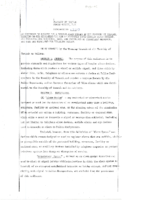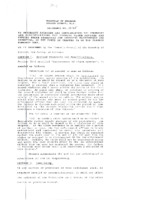In 431 E Palisade Avenue Real Estate, LLC, et al. v. City of Englewood, a Federal Judge just ruled that the city of Englewood is not permitted to enforce its zoning rules, because plaintiffs are likely to succeed on the merits at trial of showing that the City’s Zoning Ordinances violate the Fair Housing act, thereby rendering them unconstitutional. The current zoning rules do not permit assisted living and memory-care facilities in the regular residential zones (R-AAA), which plaintiffs claim is discriminatory. Continue reading “Interesting Land Use Decision in Englewood”
Category: Ordinances
A request for help and an issue of alarm
One question that comes up often, is about the difference between a resolution and an ordinance. The State statute spells out a technical difference (click here for NJSA 40:49-1), but one simple distinction is that ordinances are forever, while resolutions expire with the council that passes it.
The “forever” aspect of ordinances has some interesting effects when the future is very different than the era in which it was passed.
If you’ve been following these posts, you’ve already seen us send ordinances forbidding residents from wearing the dress of the opposite sex off our books. Same for ordinances requiring visual access from the street for businesses (to prevent speakeasies during prohibition), banning pinball (to protect the children) and dozens more that were so far past their expiration that it was clear someone should finally remove them from the official code-book.
But we are far from done.
There are rules and regulations that we are subject to now that have no relationship to their original purpose. And I’d like your help identifying them.
While I’m taking suggestions — I’m by no means offering promises.
I pledge to tackle the most far reaching and burdensome suggestions first. I will look into the original reasons for the rule and discuss the issues with current department heads. After I get input from the departments, the manager and my colleagues on council, I’ll put forward an ordinance to tweak or repeal the old rules, if it’s deemed appropriate.
Alarm Systems
As an example, let’s take a Teaneck Code 3A-3 Registration of Alarm Systems
According to Census data, the largest population numbers appear in the 1970’s, which had several thousand more at the peak, than we have today.
Along with the rise in population, came the advent of the residential alarm system. Unfortunately, the systems were not very reliable. As per sources at the time, it didn’t take much to set these alarms off.
The Record (3/23/78):
“They can set these alarms off by looking at them funny,” one officer said. “The wind sets them off.”
“There were 2,336 false burglar alarms in Teaneck in 1977, and 18 over the past weekend alone. Police say there is an average of eight false alarms – each of which requires a patrolman to rush to the scene – a day in Teaneck”
Police were being dispatched immediately, and resources were being stretched thin. Upwards of 6 to 8 false alarms were coming in every day.
In a memorandum from Police Chief Fitzpatrick to the Township manager later that year, they described the problems alarms were posing in the township.
“Through August 31st, 1977, there were a total of 1,546 accidental / false alarms, an average of 6.36 per day”
Adding to the problem, residents were even reported to be testing police response times by intentionally setting off false alarms.
To solve the issue of false alarms, an ordinance was requested, which would create a fine for false alarms (Council decided to impose this fine only after the third false alarm).
Another issue, compounding the police resource problem was the advent of automated call systems. When an alarm would go off, some systems would “call-in” to the police department. As per The Sunday Record on April 2, 1978:
Some remote systems have an automatic dialer which, in the event of an alarm, sends a prerecorded message over telephone lines to anyone you choose. (Do not direct the message to police without prior approval.)
Care to guess what happened next?
So, in an effort to find out who to contact, when a machine declared in robotic cadence that they must be dispatched to a particular residence, a registration requirement, indicating a telephone number where the owner and authorized contact could be found, was also included in the ordinance.
False alarms and Registration needs in 2019
Today, both requirements are still in force, as well as a subsequent requirement that all alarms stop sounding after 20 minutes.
The need to reduce false alarms is still valid and the fine (after three false alarms) is serving its purpose of deterrence. The 20 minute deadline to shut off the alarm is more than sufficient in an era of police response times of fewer than 5 minutes.
But, do we need a registration requirement for every alarm in town?
That’s the question I sought to answer.
I asked about the number of alarms we have registered1 (it’s just 987) and the amount of money we spend processing the requests (in terms of salaried employees dealing with pen and paper renewal forms, checks for payment, etc…). As per the police department, we don’t track individual internal costs,
But most importantly, are there any automated calls coming in, for which we need the requirement to begin with?
As it turns out, alarm companies are now calling in alarms with live operators, while simultaneously raising owners on the second line. Further, the requirement, to the extent a handful of people abide by it, could be prohibiting people from installation of systems, which would themselves, cause a deterrence effect in terms of break-ins and thefts.
Therefore, I’m introducing this ordinance to remove the residential registration requirement. It may have made some sense in the era of automated calls in the pre-mobile phone days, but it seems to have outlived its usefulness.
If anything, a need to have an point of contact for every homeowner may be more worthwhile. But I’ll let someone articulate that need before I think of creating any regulations that may seem like overkill when my kids are old enough to remove unnecessary rules made today.
The cycle continues.
Let me know where I should look next.
- I requested information from the Police Chief last year when I started looking into this. Here are some of the stats he provided as of August, 2018:
- Number of alarms registered in town: 987
- Administrative Cost: Unknown
- Employees involved: The clerks in the TPD Records Bureau process the applications/violation notices and handle payments
- Number of violations: 30 ($1050.00 collected and $750.00 billed)
On advice of counsel….
Well, that didn’t take long.
We hadn’t even had the second reading on our flag ordinance policy1 yet (that took place at our September 10th meeting this evening), and we already got the first threat of a lawsuit — from an individual demanding we also raise a pro-life flag.
For those that haven’t been flowing the issue closely: Continue reading “On advice of counsel….”
Proposed Changes To Garbage Hauling Hours (with list as currently permitted in 2019/04)
In NJ, garbage haulers can operate during specific hours. What those hours are depends on two things:
1) The tariffs issued by the State and County
2) Requirements of municipal ordinance
The Teaneck Municipal Code does not currently contain any restrictions on when haulers may operate, so the times default to tariff schedules. Those times are listed below for the various haulers in Teaneck.
As you will see, some haulers (Armaniaco & Son, LLC, Generation Waste Services, Inc., Ippolito Industries, Inc., Interstate Waste Services of NJ, and Waste Management of NJ) can operate around the clock, 24/7. For many, that means loud disruptions at 4am or sometimes even earlier.
The council will be taking up garbage collection hours in our May meeting. The proposal will limit hauling hours to a minimum of 5am. Several weeks ago, we also reached out to all sanitation companies requesting comment as to whether the proposed change will affect their ability to operate and / or cause an increase in prices.
As of today, we have not received a response.
The current version of Ordinance 11-2019 can be found here: AN ORDINANCE AMENDING AND SUPPLEMENTING CHAPTER 19 OF THE TOWNSHIP CODE ENTITLED “GARBAGE AND REFUSE” RESPECTING HOURS OF COLLECTION
TL;DR I’ve requested the current times of operation of various haulers in town ad we plan to curtail excessively early runs. The information is now available below: Continue reading “Proposed Changes To Garbage Hauling Hours (with list as currently permitted in 2019/04)”
Public Comment is not Testimony: A primer on when / how to speak at public meetings
Public input at meetings of council and statutory boards is critical to the proper functioning of government. But not all opportunities to speak are the same.
If you came out to speak at yesterday’s Zoning Board hearing against an application – it was not entered in the record for the application.
In this post, I’ll outline the problem and then make a few suggestions as to how we might find a fix.
Types of Public Input
The code was meant to be a shield, but someone is using it as a sword
In my previous post (Sidewalks – the deal you didn’t know you made), I discussed some of the origins of our sidewalk codes and explained a little bit about the deal residents made to repair them if they became a hazard.
In this post, I want to focus a little bit on how our municipal code operates and the norms that existed when certain provisions were created.
The importance of Norms
While it’s clear that residents who wanted sidewalks, agreed to fix them if they fell into disrepair, problems became apparent from the start. New residents would buy homes and discover they had to fix sidewalk slabs, coming to council for relief.
Here is how Councilman Haggerty described the problem in January of 1948: Continue reading “The code was meant to be a shield, but someone is using it as a sword”
Why re-codification of the Teaneck Code is important
At some point in the past, the township passed a rule to prohibit businesses from operating on the first floor of buildings. Not only could they not operate, say, in a basement — but they had to be seen from the street.
Maybe this provision made sense at some point in time. It has become pointless today.
Whether or not it made sense when the provision was last tinkered with (in 1951) is debatable, but it appears that I’m not the first person to think this is pointless and counter-productive. Teaneck also considered it pointless in 1973.
That’s the year that the Teaneck Council passed ordinance 1568, which reads in relevant part:
Continue reading “Why re-codification of the Teaneck Code is important”Section 3. That Sec. 5-14 entitled “Buildings to be open to public view” and Sec. 5-15 entitled “Business to be conducted at street level; exception as to bowling alleys” of said Chapter 5 entitled “Amusements” be deleted in their entirety“. (emphasis added)
No, Teaneck is NOT legalizing dog fighting…..
But we ARE working to clean up our code, which contains a lot of anachronistic, unconstitutional and irrelevant provisions.
This Monday, the Township will hear the first reading on Ordinances 32-2018 and 33-2018, which repeal 21 sections of the code. Continue reading “No, Teaneck is NOT legalizing dog fighting…..”
[UPDATE x2] [LAWSUIT] Senator Weinberg to Teaneck Business: Not in my backyard!
There’s a new kid-friendly establishment coming to Teaneck, but not if State Senate Majority Leader Loretta Weinberg has anything to say about it.
Senator Loretta Weinberg, in her capacity as our representative, has sued the Township and a business trying to open up in “her” building (full complaint available below).
The tenant, Teaneck Speedway LLC wishes to put in two amenities:
1) Slot-Car Racing tracks and 2) a Mini-Bowling area. (The latter is kind of a mix between skee-ball and bowling)
Here’s what it will look like: Continue reading “[UPDATE x2] [LAWSUIT] Senator Weinberg to Teaneck Business: Not in my backyard!”
Save the Date: Teaneck Council Reorganization on July 2, 2018
On Monday, July 2, 2018 at 6:30 pm, the Teaneck Council will hold the semi-annual reorganization meeting at the Teaneck Town Hall.
We will be swearing in Gervonn Romney Rice, Elie Y. Katz, Keith Kaplan & Jim Dunleavy.
In addition, Council will elect the Mayor & Deputy Mayors, among others.

For those that may not be familiar with the way the Teaneck Council operates, I’d like to offer some additional information:
How does our system work?
Teaneck utilizes the Council-Manager form of Government under the Faulkner Act. What that means in practice is that residents choose their council-members “at-large” (i.e. you vote for everyone, as opposed to a ward system like neighboring Englewood) and the Council as a body, once elected and seated, chooses a mayor from among the council-members (as opposed to municipalities where the Mayor runs separately). Continue reading “Save the Date: Teaneck Council Reorganization on July 2, 2018”

